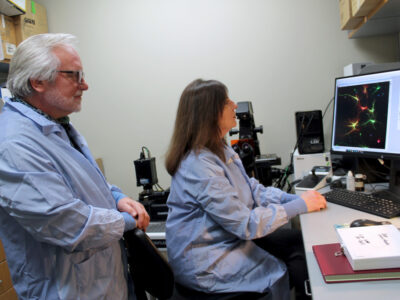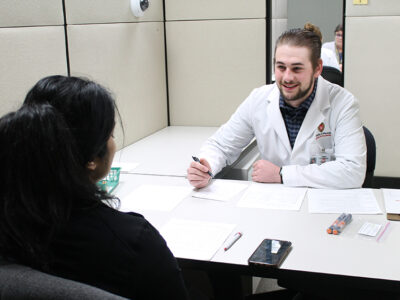15
February

 Barry Gidal, professor (CHS) and Chair, Pharmacy Practice Division, and Ed Elder, director, Zeeh Pharmaceutical Experiment Station and senior lecturer, MS Biotechnology Program, School of Medicine and Public Health, are among the authors of a study related to the treatment of epilepsy.
Barry Gidal, professor (CHS) and Chair, Pharmacy Practice Division, and Ed Elder, director, Zeeh Pharmaceutical Experiment Station and senior lecturer, MS Biotechnology Program, School of Medicine and Public Health, are among the authors of a study related to the treatment of epilepsy. Published in the online edition of The Lancet Neurology, the “New study confirms different generics have equal efficacy when treating epilepsy: Trial assessed FDA standards, confirmed no measurable difference when switching between generics.” The study tested two generic lamotrigine (prescription antiepileptic) products and found no detectable difference in clinical effects among patients in the trial. The research was a collaboration of multiple academic institutions, with the University of Cincinnati Academic Health Center serving as the primary location. The Lancet Neurology’s Impact Factor is 21.9 (ResearchGate) and ranks first among 194 journals in the clinical neurology category (2013 Journal Citation Reports®, Thomson Reuters 2014). The journal provides an authoritative and independent forum for the highest quality clinical neurology research, reviews, and news in all areas of global clinical neurology with a particular focus in the research and treatment of stroke, MS, movement disorders, epilepsy, headache, and dementia. “The issue of generic substitution of antiepileptic drugs (AEDs) has been a very controversial, and sometimes contentious issue in the medical community for the past decade or so,” said Gidal. “A number of case reports, and retrospective analyses have suggested that substitution of branded medication for a generic formulation may result in loss of seizure control, or new adverse effects.” Until this study, no prospective, controlled studies have been performed that have been designed to rigorously test current FDA bioequivalence guidelines in patients with epilepsy. The multi-year, multi-center pharmacokinetic study was specifically designed to evaluate one of the more concerning aspects of generic substitution: substitution of one generic product for another generic product, in this case, lamotrigine. The approach was rather unique, in that instead of healthy subjects, we enrolled patients with epilepsy. In addition, the product selection procedure was also unique. Using the expertise of the Zeeh Station, researchers conducted in vitro dissolution and content uniformity testing in order to pick the most disparate generic products for the human PK study. In the end, they found that no significant differences existed in the in vivo pharmacokinetic performance. In addition, while the study was not designed to evaluate clinical outcomes, it is noteworthy that again, no differences in either seizure frequency or adverse effects were seen. Researchers are hopeful that this new data will give the medical and pharmacy community some reassurance that current FDA bioequivalence guidelines are adequate and appropriate for patients. Gidal has a clinical practice focusing on the pharmaceutical care to patients with epilepsy. His research interests are pharmacokinetics, pharmacodynamics, and the metabolic effects of anticonvulsant medications. Following 16 years in the pharmaceutical and drug delivery industry, Elder joined the UW-Madison School of Pharmacy in April 2006 and assumed his current role as Director of the Zeeh Pharmaceutical Experiment Station in July 2007. Elder is an affiliate of the School’s Pharmaceutical Sciences Division and lecturer with the School of Medicine and Public Health.
Published in the online edition of The Lancet Neurology, the “New study confirms different generics have equal efficacy when treating epilepsy: Trial assessed FDA standards, confirmed no measurable difference when switching between generics.” The study tested two generic lamotrigine (prescription antiepileptic) products and found no detectable difference in clinical effects among patients in the trial. The research was a collaboration of multiple academic institutions, with the University of Cincinnati Academic Health Center serving as the primary location. The Lancet Neurology’s Impact Factor is 21.9 (ResearchGate) and ranks first among 194 journals in the clinical neurology category (2013 Journal Citation Reports®, Thomson Reuters 2014). The journal provides an authoritative and independent forum for the highest quality clinical neurology research, reviews, and news in all areas of global clinical neurology with a particular focus in the research and treatment of stroke, MS, movement disorders, epilepsy, headache, and dementia. “The issue of generic substitution of antiepileptic drugs (AEDs) has been a very controversial, and sometimes contentious issue in the medical community for the past decade or so,” said Gidal. “A number of case reports, and retrospective analyses have suggested that substitution of branded medication for a generic formulation may result in loss of seizure control, or new adverse effects.” Until this study, no prospective, controlled studies have been performed that have been designed to rigorously test current FDA bioequivalence guidelines in patients with epilepsy. The multi-year, multi-center pharmacokinetic study was specifically designed to evaluate one of the more concerning aspects of generic substitution: substitution of one generic product for another generic product, in this case, lamotrigine. The approach was rather unique, in that instead of healthy subjects, we enrolled patients with epilepsy. In addition, the product selection procedure was also unique. Using the expertise of the Zeeh Station, researchers conducted in vitro dissolution and content uniformity testing in order to pick the most disparate generic products for the human PK study. In the end, they found that no significant differences existed in the in vivo pharmacokinetic performance. In addition, while the study was not designed to evaluate clinical outcomes, it is noteworthy that again, no differences in either seizure frequency or adverse effects were seen. Researchers are hopeful that this new data will give the medical and pharmacy community some reassurance that current FDA bioequivalence guidelines are adequate and appropriate for patients. Gidal has a clinical practice focusing on the pharmaceutical care to patients with epilepsy. His research interests are pharmacokinetics, pharmacodynamics, and the metabolic effects of anticonvulsant medications. Following 16 years in the pharmaceutical and drug delivery industry, Elder joined the UW-Madison School of Pharmacy in April 2006 and assumed his current role as Director of the Zeeh Pharmaceutical Experiment Station in July 2007. Elder is an affiliate of the School’s Pharmaceutical Sciences Division and lecturer with the School of Medicine and Public Health.







